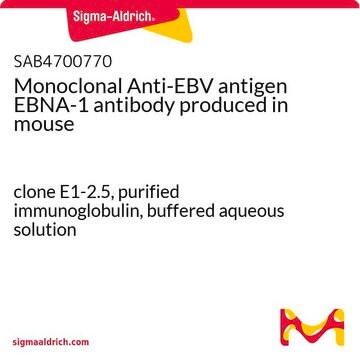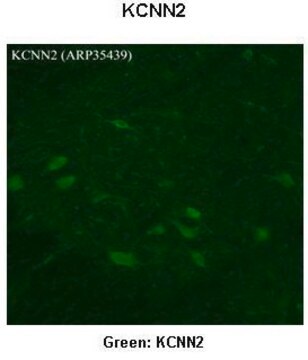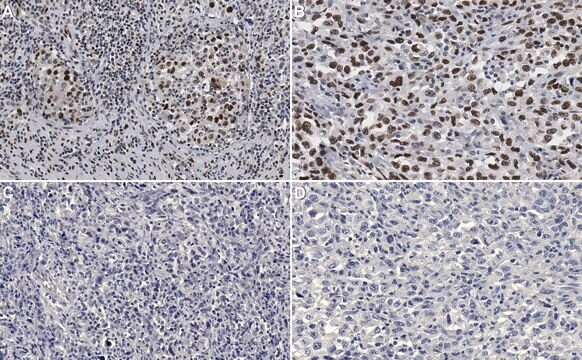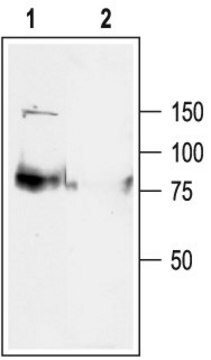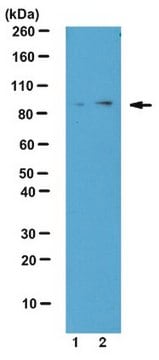推荐产品
生物源
mouse
品質等級
抗體表格
purified antibody
抗體產品種類
primary antibodies
無性繁殖
K78/29, monoclonal
物種活性
human, rat, mouse
技術
immunohistochemistry: suitable (paraffin)
western blot: suitable
同型
IgG1κ
NCBI登錄號
UniProt登錄號
運輸包裝
wet ice
目標翻譯後修改
unmodified
基因資訊
human ... KCNN2(3781)
一般說明
Small conductance calcium-activated potassium channel protein 2 (UniProt P70604; also known as SK2, SKCa 2, SKCa2, KCa2.2) is encoded by the Kcnn2 gene (Gene ID 54262) in rat species. Small conductance calcium-activated potassium channels mediate cell membrane repolarization following intracellular Ca2+ increase induced by various stimuli, thereby restoring an excited cell back to its resting state. SK2 is involved in afterhyperpolarization (AHP) that follows action potentials in vertebrate neurons. SK2 regulates neuronal excitability by contributing to the slow component of synaptic AHP. Ca2+ activates SK2 through the Ca2+ sensor calmodulin (CaM), which can bind up to four Ca2+ ions. The dynamic coupling between Ca2+ binding to CaM, CaM binding to SK, and the open probability of SK are all essential components of the SK2 activity.
特異性
Clone K78/29 detects endogenous KCa2.2 in rat brain membrane extracts, as well as the transiently expressed rat SK2 (KCa2.2), but not SK1 (KCa2.1), SK3 (KCa2.3), SK4 (KCa3.1, KCa4), or Kv2.1 constructs in transfected COS-7 cells. Exprected to react with both spliced isoforms of human KCa2.2 reported by UniProt (Q9H2S1).
免疫原
Epitope: C-terminal cytomplasmic region.
Linear peptide corresponding to a C-terminal cytoplasmic domain sequence of rat SK2 (KCa2.2).
應用
Anti-SK2 (KCa2.2) Antibody, clone K78/29 is an antibody against SK2 for use in Western Blotting, Immunohistochemistry (Paraffin).
Immunohistochemistry Analysis: An 1:50 dilution from a representative lot detected SK2 (KCa2.2) immunoreactivity in human cerebellum, human cerebral cortex, mouse brain, mouse skeletal muscle, rat kidney and rat testis tissue sections.
Western Blotting Analysis: A representative lot detected the transiently expressed rat SK2 (KCa2.2), but not SK1 (KCa2.1), SK3 (KCa2.3), SK4 (KCa3.1, KCa4), or Kv2.1 constructs in transfected COS-7 cells (Courtesy of Professor. James S. Trimmer, UC Davis, CA, USA).
Immunohistochemistry Analysis: A representative lot detected SK2 (KCa2.2) immunoreactivity in adult rat brain hippocampus sections (Courtesy of Professor. James S. Trimmer, UC Davis, CA, USA).
Western Blotting Analysis: A representative lot detected the transiently expressed rat SK2 (KCa2.2), but not SK1 (KCa2.1), SK3 (KCa2.3), SK4 (KCa3.1, KCa4), or Kv2.1 constructs in transfected COS-7 cells (Courtesy of Professor. James S. Trimmer, UC Davis, CA, USA).
Immunohistochemistry Analysis: A representative lot detected SK2 (KCa2.2) immunoreactivity in adult rat brain hippocampus sections (Courtesy of Professor. James S. Trimmer, UC Davis, CA, USA).
Research Category
Neuroscience
Neuroscience
Research Sub Category
Ion Channels & Transporters
Ion Channels & Transporters
品質
Evaluated by Western Blotting in rat brain tissue lysate.
Western Blotting Analysis: 2.0 µg/mL of this antibody detected SK2 (KCa2.2) in 10 µg rat brain tissue lysate.
Western Blotting Analysis: 2.0 µg/mL of this antibody detected SK2 (KCa2.2) in 10 µg rat brain tissue lysate.
標靶描述
~45 kDa observed. 63.85 kDa (rat), 63.76 kDa (human isoform 1), 26.34 kDa (human isoform 2), 91.60 kDa (mouse) calculated.
外觀
Protein G Purified
Format: Purified
Purified mouse monoclonal IgG1κ antibody in buffer containing 0.1 M Tris-Glycine (pH 7.4), 150 mM NaCl with 0.05% sodium azide.
儲存和穩定性
Stable for 1 year at 2-8°C from date of receipt.
其他說明
Concentration: Please refer to lot specific datasheet.
免責聲明
Unless otherwise stated in our catalog or other company documentation accompanying the product(s), our products are intended for research use only and are not to be used for any other purpose, which includes but is not limited to, unauthorized commercial uses, in vitro diagnostic uses, ex vivo or in vivo therapeutic uses or any type of consumption or application to humans or animals.
未找到合适的产品?
试试我们的产品选型工具.
儲存類別代碼
12 - Non Combustible Liquids
水污染物質分類(WGK)
WGK 1
閃點(°F)
Not applicable
閃點(°C)
Not applicable
Ferdi Ridvan Kiral et al.
Cell stem cell, 30(5), 677-688 (2023-04-06)
Human brain organoids provide unique platforms for modeling several aspects of human brain development and pathology. However, current brain organoid systems mostly lack the resolution to recapitulate the development of finer brain structures with subregional identity, including functionally distinct nuclei
我们的科学家团队拥有各种研究领域经验,包括生命科学、材料科学、化学合成、色谱、分析及许多其他领域.
联系技术服务部门